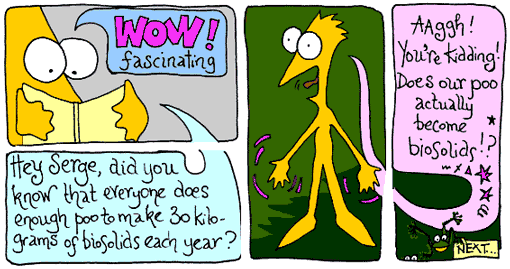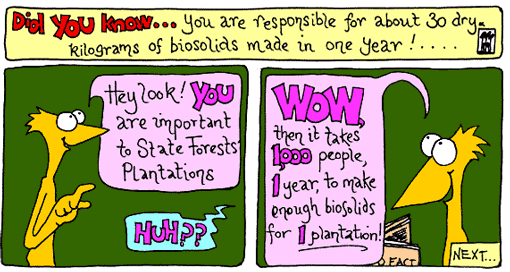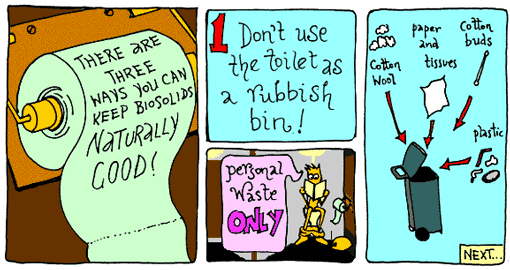 Wastewater treatment is an important mechanism that operates mainly to protect the public health from contamination. Wastewater contains a mixture of liquid and solid harmful pollutants which are eliminated in the process of filtration. Biosolids, or digested sewage solids are the by-product of municipal wastewater treatment that can be beneficially and safely recycled. But how can sewage solids possibly be beneficial?
Wastewater treatment is an important mechanism that operates mainly to protect the public health from contamination. Wastewater contains a mixture of liquid and solid harmful pollutants which are eliminated in the process of filtration. Biosolids, or digested sewage solids are the by-product of municipal wastewater treatment that can be beneficially and safely recycled. But how can sewage solids possibly be beneficial?  Biosolids are a nutrient-rich organic material and are considered for use as fertilizers to improve and maintain productive soils and as a plant growth stimulator. The land application of biosolids are preferred over the use of conventional fertilizers, which reduces the demand for chemical fertilizers. There are numerous advantages of the responsible and safe biosolids recycling. The use of biosolids can improve crop production, reduce soil erosion and protect water quality, provide topsoil for recreational uses. promote plant growth in abandoned mined lands, conserve landfill space, and also provide economic incentives. The management concept of recycling biosolids has been around for thousands of years in an effort to maintain soil. It has been used for decades, with no demonstrated adverse affects to human health. By recycling biosolids, it provides an environmentally sound alternative to disposal of wastes so we can help conserve landfill space and save communities money.
Biosolids are a nutrient-rich organic material and are considered for use as fertilizers to improve and maintain productive soils and as a plant growth stimulator. The land application of biosolids are preferred over the use of conventional fertilizers, which reduces the demand for chemical fertilizers. There are numerous advantages of the responsible and safe biosolids recycling. The use of biosolids can improve crop production, reduce soil erosion and protect water quality, provide topsoil for recreational uses. promote plant growth in abandoned mined lands, conserve landfill space, and also provide economic incentives. The management concept of recycling biosolids has been around for thousands of years in an effort to maintain soil. It has been used for decades, with no demonstrated adverse affects to human health. By recycling biosolids, it provides an environmentally sound alternative to disposal of wastes so we can help conserve landfill space and save communities money. Biosolids can be easily mistaken as an unsanitary practice that can be harmful to the health of humans. The most common concerns related to biosolids have to do with toxic pollutants, odor, nutrients, and pathogens. Biosolids may contain small traces of metals that are known to be potentially harmful to humans. Organic compounds (e.g. pesticides) found in biosolids are present in concentrations near the lowest detectable limits. Improperly managed application of biosolids can cause odor problems, especially in residential areas.
Overall, the agricultural use of biosolids can be beneficial to humans as we as the environment. Proper management of biosolids will show now significant risk to the environment and human health. The benefits of biosolids far exceeds the disadvantages as it offers an environmentally sound alternative to the disposal of wastes, while health risks are negligible if it complies to the regulatory requirements.
References:
"Biosolids Benefits."biosolids.com. N.p., n.d. Web. 10 May 2011. <http://www.biosolids.com/benefits.html>.
"Biosolids Program."Department of Environmental Protection. N.p., n.d. Web. 10 May 2011. <http://www.portal.state.pa.us/portal/server.pt/community/biosolids/10588>.
"Common Concerns."biosolids.com. N.p., n.d. Web. 10 May 2011. <http://www.biosolids.com/concerns.html>.
"FAQ - Biosolids."CCWA/ACEPU. N.p., n.d. Web. 10 May 2011. <http://www.cwwa.ca/faqbiosolids_e.asp>.
"Frequently Asked Questions."biosolids.com. N.p., n.d. Web. 10 May 2011. <http://www.biosolids.com/faq.html#08>.
Commented Blog Posts:



hey Bridgette
ReplyDeletei really enjoyed your blog it was informative and truly stated your information in a well put and organized mannor. the pros and cons were very clear and truly went in depth about biosolids. i did not know that this practice was present for thousands of years; it truly shows how old practices can stil be very significant till this day. I do agree with your conclusion, biosolids have more pros than cons, though the idea might be hard to grasp, i do believe it is the best fertilizer to be used in terms of enviromental effects.
very good work :)
Wasssup Bridge-o :)
ReplyDeleteNice blog. I found it to be informative and very enjoying. I think my most favourite part was when you talked about how people might think that this method of farming is unsanitary. In reality it would only pose as a hazard unless the biosolid is treated improperly. It's good to know the pros and the cons of this subject because we are dealing with food that could potentially end up in our stomach. All in all I also agree with you that this type of fertilizing method is very beneficial for the environment.
I agree that the use of biosolids as fertilizer would be beneficial to the environment. Biosolids are safe to use after they have gone through the treatment system but people's own views on human waste is what actually prevents them from using it. Reusing human waste comes with many benefits such as using less space in landfills and saving the world's resources as the fertilizer we use now would not be needed. Some people may not like the odor of the biosolids but if it is put through good treatment, it should not smell. Pipes in which the waste water travels through have improved over the years so there is barely any trace of metals in the biosolids today. I agree that if the biosolids are handled properly, there will be no risks in using it as fertilizer. Nice blog :)
ReplyDeleteIt's amazing how this concept of recycling biosolids have been an ongoing project since time! After reading your blog and researching the internet about the ways treatment plants ensure that there are close to no pathogens, bacteria, etc., it is safe to agree that we have come a long way regarding technology. Living in today's day and age, everyone is always talking about being "green". It's astonishing how scientists (and others of that nature!) are able to discover these new recycling ways to not only help out our environment, but also get the job done! Great job :D
ReplyDeleteI think you greatly explained your point in your bio blog. It was really interesting to read how you pointed out how biosolids can be mistaken as something negative just because it is considered waste to human beings. Biosolids contain numerous of important elements that can really benefit the earth. Also, it was great how you pointed out how biosolids can also be recycled through using it as agriculture, which means less waste for the earth! It's a win win :) yay!
ReplyDelete